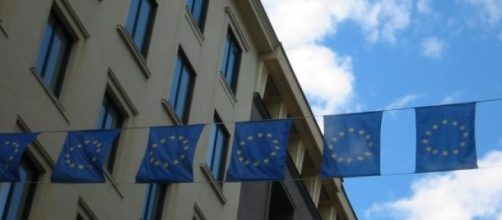Russia had been under EU andUS sanctions as a result of its involvement in Ukraine. But sanctions are also damagingEuropean economies as well. The sanctions against Moscow and slumping oilprices led to the sluggish of Russian economy and the sinking of its currency. Therubble lost about half its value and the Russian economy has descended into recession.
led to the sluggish of Russian economy and the sinking of its currency. Therubble lost about half its value and the Russian economy has descended into recession.
Sanctions target Russianbanks and oil companies and have banned arms exports and export of dual-usegoods and will be in place till July 2015. German Chancellor Angela Merkel`sspokesman Stephen Seibert was quoted by Associated Press in mid October 2014saying that the sanctions are in response to concrete situations from Russian sideand concrete situations in eastern Ukraine.
Russia has responded to theEU sanctions by imposing retaliatory measures against Europe's biggest companiesin different domains such as banks, oil companies, machinery makers and foodgiants that do business in Russia.
According to AssociatedPress reports, western sanctions have hurt European companies that dobusiness in or with Russia. The report indicates that some Russian clients canno longer pay them because they are going into debts or payments are blocked insanctions-hit banks. Additionally demand has dried up because Russians arestruggling financially.
This crisis is adding up toEuropean countries economic woes. “Deflation in the euro zone is all too closeand extremely dangerous” according to The Economist report in late October lastyear.
The Economist reported thatthe zone`s overall inflation rate has slipped to 0.3% and may well go intooutright decline in 2015. It further pointed out that the region that makes upalmost a fifth of world output is marching towards stagnation and deflation.
Although Russia's economy hasdescended into recession as a result of EU sanctions, Russian authorities madesure that European economies also suffer in consequence. AssociatedPress reported that Moscow has imposed a one year ban on imports on a range of foodproduced by EU countries, hitting Lithuanian dairy farmers, Italian cheesemakers and Belgian apple growers alike.
However some EU membercountries such as France and Italy would like to lift the sanctions againstRussia while Poland, Britain and the Baltic countries want tomaintain them.
Zsolt Darvas, a senior fellow at Bruegel think tank in Brusselspointed out this position to the Associated Press.
Russia was condemned by theEuropean Union over its annexation of Crimea peninsula, a region that belongedto Ukraine since 1954 after the World War II. Russia annexed Crimea peninsulalast March directly after the ousting of pro-Russian President ViktorYanukovych. Moscow was accused by the EU and the US of supplying pro-Russianseparatists in Eastern Ukraine with ammunition and combatants.
Talks on lifting thesanctions are scheduled on January 15 in Astana, Kazakhstan. Before thebeginning of the meeting, France and Germany said that western sanctionsagainst Russia had reached their limits and could only make things worse as reported by a EurActiv.com news report.
Apparently sanctions arehurting both sides of the conflict. But it won`t be easy to lift them as itwill require a unanimous decision by all 28 EU nations. Unfortunately they aredivided on this matter according to the Associated Press report by DavidRising, John Thor Dahlburg and Raf Casert.

